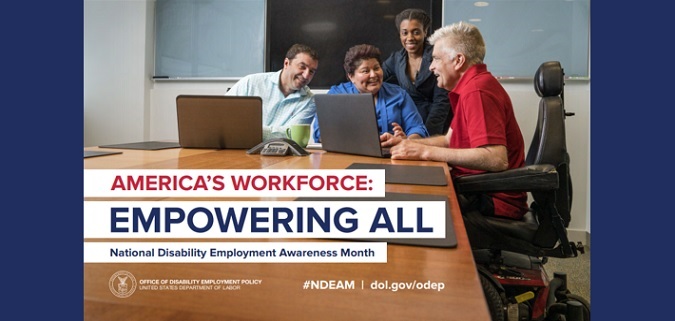
October is National Disability Employment Awareness Month and all members are encouraged to participate in the observance. The 2018 theme is, “America’s Workforce: Empowering All.”
Workplaces welcoming the talents of all people, including people with disabilities, are a critical part of our efforts to build an inclusive community and strong economy. In this spirit, Federally Employed Women (FEW) recognizes National Disability Employment Awareness Month this October to raise awareness about disability employment issues and celebrate the many and varied contributions of people with disabilities. Activities during this month will reinforce the value and talent people with disabilities add to our workplaces and communities and affirm FEW’s commitment to an inclusive organization.
The purpose of National Disability Employment Awareness Month is to educate about disability employment issues and celebrate the many and varied contributions of America’s workers with disabilities. National Disability Employment Awareness Month began in 1945, when Congress declared the first week in October each year “National Employ the Physically Handicapped Week.” In 1962, the word “physically” was dropped to acknowledge individuals with all types of disabilities. Then in 1988, Congress expanded the week to a month and changed the name to National Disability Employment Awareness Month. Held annually, National Disability Employment Awareness Month is led by the U.S. Department of Labor’s Office of Disability Employment Policy, but its true spirit lies in the many observances held at the grassroots level across the nation every year.
For specific ideas about how FEW members can support National Disability Employment Awareness Month, you can visit www.dol.gov/ndeam or email the FEW Special Assistant for People with Disabilities at disbilities@few.org. Suggestions range from simple, such as putting up a poster, to comprehensive, such as implementing a disability education program. Regardless, all play an important part in fostering a more inclusive workforce, one where every person is recognized for his or her abilities — every day of every month.
Karen Rainey, President


